| [Page 7]

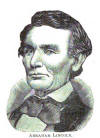
ABRAHAM LINCOLN
The reader will
naturally ask "Why do you place the portrait of Abraham
Lincoln among the old settlers of Champaign county?"
We answer, because he practiced law here for many years, and
many of the old settlers whose biographies appear in this issue
were well acquainted with him; then another reason is that while
practicing here he one day went to a gallery in Urbana in 1857,
before he became famous, to have his picture taken; he was in
his shirt sleeves, and the artist loaned him his coat to sit for
the picture. William H. Somers, now of San Diego,
California, while a resident of Beatrice, Nebraska, had a large
number of photographs taken from that old picture. He
kindly complimented the HERALD with one of these photographs.
Our artist and engraver has made the above picture from this
photograph and shows the great emancipator as he looked when he
was a western lawyer residing quietly in Springfield, Ill., and
practicing law here and in other counties. It is the only
engraving of Mr. Lincoln which shows him as he was before
he became famous in the history of the world. A biography
is unnecessary.

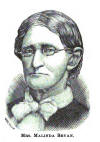
MRS. MALINDA BRYAN
The above poirtrait is
that of the first bride in Champaign county, and for that reason
we take especial pleasure in presenting it and a brief sketch of
her life. She was born in Shelby county, Kentucky, in
1812, and resided with her parents Isaac and Sarah Busey,
until she was nineteen years old, when she came with them to
Vermillion county, in 1831. Champaign was separated from
Vermillion in May, 1833, and Miss Malinda Busey was
married to John Bryan July 25th, of the same year by
Esquire J. B. Thomas, of Homer. Soon after her
marriage they went to Kentucky to visit the scenes of her youth
and spend the honeymoon with the friends of her girlhood days,
not in a palace car nor in a fine carriage, but on horseback.
Mr. Bryan rode the same horse to Kentucky and back five
times before the iron horse came to supplant this primitive
method of locomotion.
She was converted and baptized in May, 1834, under the
ministration of Isaac B. Newell, who was the preacher
that in later years organized the Baptist church in Urbana.
Mrs. Bryan remembers vividly a number of
Indian Scares, especially during the time of the Blackhawk war,
when she declares that they felt certain that old Black hawk
himself was coming on more than one occasion. John
Bryan died July 6, 1363.
[Page 8]
Mrs. Bryan has a daughter in Chicago, one in Rantoul,
wife of F. M. Avey, also one son there. Three sons
and four daughters lie buried by the side of their father in the
Bryan graveyard, near Mahomet.
Mrs. Bryan resides in Rantoul and
regularly attends the old settlers’ meeting every year, where
she is an object of great interest because she is the first
woman that entered upon the sea of matrimony within the borders
of Champaign county. She is active and intelligent and it
is to be hoped she may continue to meet with the pioneers of the
county each succeeding year for many years to come.

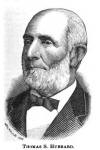
THOMAS S. HUBBARD
The New England states
have contributed more to the growth, development and permanency
of western institutions than all the other states combined.
Evidences of Yankee thrift. push and superior intelligence are
to be found on every hand throughout the great west. A new era
marked the advent of the New Englander in the west; he brought
with him culture. education and ideas, the outgrowth of his
superior advantages and education obtained in the schools of
states that were the first to recognize the importance of the
education of the masses and the fostering of institutions of
learning. Soon after their arrival school houses and
churches began to spring up and dot the land and the crude,
rough ways and pioneer customs gave way before superior
intelligence and education. Their intelligence, thrift and
energy made them valuable acquisitions and welcome visitors in
every new settlement.
The Hubbard family are originally of
English ancestry, and of an old New England family.
George Hubbard, the father of Thomas S., was a
native of Middletown, Conn. In his early life he followed
the calling of sea captain. When the embargo was laid upon
the shipping interests in 1829 by President Jackson.
he abandoned the sea and engaged in hotel keeping and farming.
He died in 1833. He married Electa Bronson.
who was born in Farmington, Conn. She died in August,
Thomas S. was the only son and eighth child. He was
born in Middletown, Conn., September 25th, 1825. He
received his education primarily in the excellent schools of his
native village, and in 1845 entered Yale college from which
institution he graduated in 1849. In that class was
Timothy Dwight, now president of Yale; also Dr.
Fisk, professor in the Congregational Theological
Seminary, of Chicago, and Dr. Morris, who now
occupies the same position in the Lane Theological Seminary, of
Ohio. After Mr. Hubbard’s graduation he
engaged in the manufacture of Japanned tinware and hardware in
Meridon and Durham, Conn. He continued thus engaged until
1854, when he closed out his interests and came west, landing in
Urbana December 8th, 1854. Here he went to church in the
primitive M. E. meeting house that stood on the spot where
Heller & Toy’s livery stable now stands, with
puncheon seats, and heard the gentle murmur of the festive hog
as he scratched his back upon the sleepers from his lair beneath
the floor. regard less of prayer or song or of the usual church
proprieties.
Here he engaged in private banking and continued until
in February, 1856; he then accepted the position of cashier in
the Grand Prairie Bank, which had a branch at West Urbana.
These were the only banks in Champaign county, prior to 1861.
Mr. Hubbard continued cashier until the latter
date; he then engaged in the grocery and hardware trade and
continued it until 1866, when he moved to Cromwell, Conn.
(formerly a part of Middletown) and remained until 1869, when he
returned to Urbana. Since the latter date he has been
engaged in the hardware trade.
When Mr. Hubbard first settled in Urbana
there was not a brick house in the town except a small one story
dwelling house situated at the southwest corner of the court
house square. The store building now occupied by M.
Lowenstern & Son was built one story and completed
the following year. The Illinois Central railroad was
finished to
[Page 9]
Champaign in the fall of 1854, but did not run trains regularly
that winter. Mr. Hubbard’s banking office
and residence from 1854 to were on the same ground now occupied
by his hardware store.
Mr. Hubbard married Miss Jane
E., daughter of Willis Woodruff M. D., of
Meriden, Conn., November 14th, 1849. Of this union there
are four children whose names are as follows: George W.,
who married Miss Edna P. Post, of Cromwell, Conn.
He is a member of the firm of Hubbard & Son, hardware
merchants, Urbana. Minnie W., Julia E. and Harry
T. are yet at home.
Mr. Hubbard and his entire family are
members of the Presbyterian church. In his political
affiliations he has always acted and voted with the republican
party; he was a member of the board of aldermen from 1875 to
1879 and from 1884 to 1886.
Mr. Hubbard is a genuine representative
of the thrift and enterprise of the New Englander described
above. He is ever ready to aid every enterprise that gives
promise of building up the town and county. He and his
son, George W., his partner, conduct one of the largest
hardware, stove and tin stores in the county and have for years
done a profitable business.

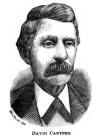
DAVID CANTNER
Was born in Bedford county, Pennsylvania, in 1817. His
parents dying while he was young he made his home with a
prominent iron merchant by the name of Shellaberger, of
Bedford county. He learned the trade of cabinet maker.
The exact date of his coming west is unknown. He worked at
his trade in Indianapolis for several years before he arrived in
Urbana. He landed here in 1839. He went to the
Sangamon and opened a store in the village of Mahomet, also kept
a hotel there, and later farmed for a year or two. In the
spring of 1842, he married, and soon after came to Urbana.
Here
he engaged in various business, but more particularly
carpentering and building. In 1866, the village of Rantoul
began to loom up. The surrounding country began to settle
up and there was a demand for houses. Mr.
Cantner went there and in a few years practically built the
town. He came back to Urbana in 1872 and here engaged in
grocery and provision trade on a large scale. He still
continued building. In 1873, be erected the St. Nicholas
hotel block and the next year put up the block of buildings on
Market street and also built several dwelling houses. The
hard times coming on caught him in close financial quarters and
he yielded to the inevitable, though not without making a
herculean struggle. It may be said of him that be
contributed more to the towns of Urbana and Rantoul than any
dozen of men. The building now occupied and known as the
Masonic Temple was built by him as early as 1856. The
brick were burned and shipped from Milwaukee. and cost $40 per
thousand. He also built the first freight house in
Champaign and was the builder of the court house and jail for
Iroquois county.
He had the most abiding faith in the future greatness,
development and prosperity of the west, he-would, in his quiet
way, undertake enterprises demanding large sums of money and
careful preparations. without a dollar in his pocket.
He trusted to luck and the growing wants of the future.
His judgment was not often at fault, his enterprises were often
interrupted, but they were always completed. He was undismayed
in the face of difficulties, that to others looked
insurmountable. There were plenty to predict his failure
in the initial move of his enterprises, but they lacked
knowledge of the man. Many men have accomplished more than
David Cantner, but few have done as much under
similar circumstances and surroundings. Had his life been
cast in many places he would have been known as a great builder
and would have risen to wealth and a high place among men.
Mr. Cantner married Miss Jane Carson,
in 1842. She died about 1870. There were three sons
by this union viz: Thomas J., who married Bertha Van
Dam. He is a merchant of Rantoul; Charles P.,
leading grocer and provision dealer of Urbana, and James H., who
is with the latter.
Politically Mr. Cantner was a republican.
[Page 10]
It is said that David Cantner bought the first
cook stove in Champaign county. He died at Urbana. in
November 1879.

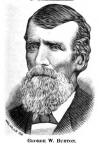
GEORGE W. BURTON.
The subject of this
sketch was born in Sussex county, Delaware, April 13th, 1825.
His parents, William and Anna (Pool) Burton moved to
Ohio, when George was in his eighth year. He came
to this county in 1852 and settled in Urbana. At that time
Urbana was a small struggling village of about one hundred
houses. There were no houses where Champaign now stands.
The Illinois Central road had not been built. He first
found employment with William Park and helped him
to saw the ties for the Central railroad. He was for a
time engaged in the bakery and grocery business on the corner of
Main and Market streets in a building now known as “Spence's
corner.” In company with James Johnson he
did the first ditching in the county. He invented and
operated the first open ditching machine in the
county. He has done much to put our farming land in a good
tillable condition. After he quit the mercantile business
he engaged in ditching and farming and still continues in the
latter.
He married Margaret Oliver, in
Barnesville, Belmont county, Ohio, July 1st, 1846. She was
born in Washington county, Delaware, Aug. 12, 1828. They
are the parents of the following children: Allen, tile
manufacturer at Philo; Mary married John Ripley,
now deceased; Eunice, married John Cover,
of Camargo, Ill.; Charles, of the firm of Burton
Bros, Philo. Mr. and Mrs. Burton are members
of the M. E. church. In politics he is a republican and
invariably votes his ticket straight. He has held the
office of highway commissioner for nine years and has been
industrious in giving us good roads. He is also school
director for his district. Mr. Burton
belongs to the industrious, energetic class of men, and he also
ranks as one of our very best citizens.

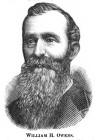
WILLIAM H. OWENS.
Among the live business
men of Urbana is W. H. Owens. He was born in
Baltimore county, Maryland, Dec. 22, 1833. He is the son
of Samuel and Eliza (Brooks)
Owens. His father was in the mercantile business and
young Owens became a clerk while young and was educated,
so to speak, behind the counter. He came west in April,
1856. He believed that this country present ed more
advantages to a young man who was industrious and desired to get
ahead in the world. Soon after his arrival here he clerked
for Eli Halberstadt for two or three years and
then for Alexander Spence, with whom he remained
for twelve years. He subsequently purchased a farm of 120
acres on the Sangamon and farmed for several years, then
returned to Urbana May 1, 1882, and purchased a stock of
groceries and provisions of Mrs. Hollister and has
continued in the trade to the present.
During this time he has also engaged in the breeding
and raising of Short Horn cattle. In his herd may be found
some of the finest specimens of that breed in the county.
[Page 11]
He has also given a great deal of attention to the improvement
in the breed of horses. He has one fine imported Norman
and also a Morgan-Belgian, equally as fine an individual as the
other. He is also interested in the breeding of superior
breeds of hogs and sheep.
Mr. Owens married Miss Sarah Wolfe,
who is still living. They are the parents of the
following named children: Joseph W., Bessie,
Lucy, Kate and Daisy. Joe is
express agent and clerk in his father’s store; Bessie is
a graduate of the University of Illinois. Mr.
Owens united with the M. E. church about 1849. He has
been a class leader for over thirty years and a member of the
official board for about the same time. He has always been
active in church affairs. Politically, he has ever been a
staunch republican, and has so far steered clear of any offices.
Mr. Owens attends to his grocery business
and at the same time looks after his Mahomet farm and fine stock
and we sincerely trust that the prosperity his labors have
brought him thus far, may be continued and increased, as he
certainly deserves that it should be so.

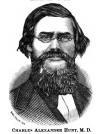
CHARLES ALEXANDER HUNT, M. D.
Doctor Hunt
was a native of Trenton, New Jersey, where he was born April
15th, 1819, and where he continued to reside until he was thrown
upon the World by the death of his father, at the tender age of
13 years. He then, in company with some of the older
members of his father’s family, emigrated to Ohio, where,
through the aid of friends and a determination and perseverance
that knew no such thing as fail, he succeeded in obtaining a
fine English and classical education. When he became of
age he entered the office of Dr. Gillett, of
Springfield, Ohio. His medical studies were completed at
the Ohio College of Medicine, Cincinnati, where he graduated
with high honors, March 6th, 1845. He did not cease study
upon his graduation, for all his life he was a close student and
extensive reader.
In 1847he was married to Isabella Hopkins
and removed to the Wabash valley, where he resided and practiced
his profession both in Indiana and Illinois until he and his
family removed to Urbana in 1855. Here he entered into the
drug business, which, as a member of the firms of Hunt,
Sim & Lindley, and Hunt & Sim. he
continued until the breaking out of the war of the rebellion.
Although warmly attached to his profession, and ardently loving
the scientific pursuits akin thereto, he in fact contracted a
dislike for the details of medical practice. Abandoning the
profession for a time, he did-not abandon his studies and
investigations connected with medicine and surgery, but was
constantly engaged, when he had leisure to do so, in reading or
writing upon topics pertaining thereto. He often published
in the medical journals and local papers his theses showing
great learning and original research. He also left among his
papers many manuscripts written upon scientific and political
topics. He was a corresponding secretary of the Chicago Academy
of Natural Sciences.
The first guns fired upon Fort Sumter, in 1861, stirred
within him a patriotic fervor which determined his future.
As soon as his business could be closed and an opportunity for
his services offered he entered the military service of the
government as surgeon of the 126th regiment of Illinois
volunteers. Here, by his faithfulness to the sick under
his charge, and his knowledge of the healing art, he warmly
attached to himself the officers and soldiers of the regiment.
Always conscientious in the discharge of duty he neither knew
nor wanted to know any other way than to faithfully stand at his
past of duty here, let it lead where it might. The
eventful siege of Vicksburg drew his regiment and with it the
surgeon to the post of danger. His hospital was located at
Haines’ Bluff, on the Yazoo, that point so renowned for its
miasma and bad water, where he spent several months in constant
personal care of the sick and Wounded, during the summer of
1863. This continued until worn out by disease, hardships
and incessant professional labors, he started
[Page 12]
for his home and family, where he might recuperate his depleted
system, or if need he, die among friends; but the hope of again
meeting the little ones at home and his faithful, loyal wife,
was never realized. Those in charge of the hospital boat
which brought
him north were compelled to leave him at the general hospital at
Mound City on the 29th of July, in charge of Doctor
Wardner, where he expired Sunday, August 2nd, 1363, only a
few hours after the arrival of his wife, who. upon hearing of
his illness, had hurried to his side. His neighbors at
home were shocked by an unexpected dispatch from Mrs.
Hunt announcing his death and the hour of her arrival with
the remains. Sadly they met her at the northern bound
train and bore the body of their esteemed friend to the home he
so much loved and so much desired and expected to again visit.
His letters to his wife and friends, while in the service,
breathed the most. ardent attachment to home. family and
friends, and often counted on the time when, duty fully done, he
would turn his face homeward and again reunite family ties and
engage in the privileges and duties of citizenship. But,
alas, this was not to be and he peacefully yielded up his life
as did so many others, that his country might be saved.
Sorrowfully were his remains laid to rest by admiring and
afflicted friends amid the surroundings so much loved by him in
life.
His wife, Mrs. Isabella Hunt,
after a widowhood of twenty-three years, still survives him.
His sons, J. E. Hunt, a popular druggist of this city,
Isaac Lindly and Cory A. have since then grown to
manhood and to lives of usefulness, but his only daughter,
Sarah V., followed her father to the grave, in 1865.
Dr. Hunt was eminent in every sense.
In the social circle, by his wit, his wisdom and his guileless
attachment to his friends and associates, he warmed all hearts
towards him. In the language of a prominent member of the
medical staff. who was thrown much in his society. “He had
no enemies and he deserved none." He was a leader in
society so for as taking the front in every movement for its
elevation. In him the infant schools of the country had a
faithful and very useful friend. He was an early friend of
the slave and entered warmly into the movement for the formation
of a party unfriendly to the extension of slavery. Up on
political topics he wrote and published much, always in the most
logical and convincing style. As a neighbor and a friend
he was warm-hearted, obliging and sincere. We can do no
better than to close with a quotation from an obituary notice
published in a local paper of that day: “He was deeply
learned in his profession, an elaborate and profound thinker and
writer. In all those qualities which go to make up the
good and honored citizen, his life and character were rich, and
in those qualities of heart and mind which endeared him strongly
to his neighbors and friends, he abounded superlatively."

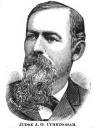
JUDGE J. O. CUNNINGHAM.
This old settler,
lawyer, journalist and jurist, of Urbana, was born in Lancaster,
Erie county, N. Y., Dec. 12, 1830. He was the eldest
child of Hiram W. and Eunice (Brown) Cunningham. Miss
Brown was of the Brown family, of Vermont: her
grandfather carried on the first carding and falling mill in the
then colony of Vermont, before the revolutionary war.
Hiram W. was descended from the Cunninghams of
Connecticut, who settled there in the latter
half of the seventeenth century. Hiram W. removed
with his parents in 1811 to what was known as the “Holland
Purchase,” Erie Co., N. Y. In 1833 he removed from there
to Huron county, Ohio, where he died in 1866. J. O.
Cunningham began his education in the district schools of
Ohio, and continued it in the Baldwin Institute at Berea, Ohio:
later he attended the famous Oberlin college. In 1852, he
pushed further west and taught school at Eugene, Vermilion
county, Indiana. There he began the study of law a
profession in which he was destined to be successful. He
came to Urbana. June 18th, 1853, returned to Ohio and was
married at Bainbridge, Ohio, October 13th, 1853, to
[Page 13]
Mary McConoughey, who still lives and presides,
with true womanly grace and ability, over as pleasant a home as
may be found in this county. It is located just outside
the city limits, northeast of town, where the judge and his much
valued partner are surrounded by all the luxuries to be enjoyed
in this community. He is a vigorous and versatile writer
and soon after he came here he purchased the Urbana Union of
Col. W. N. Coler, and for a time published it with a man
named Benjamin A. Roney: later, in partnership with G.
N. Richards, and afterwards with G. W. Flynn, each of
his partners being practical printers. In the campaign of 1856,
the Union was radically for Fremont and the republican ticket.
Mr. Cunningham retired from the Union in 1858.
He then attended the Union law college at Cleveland, Ohio,
graduating in 1859, and on the first of May of that year formed
a partnership with J. W. Sim, which lasted about five
years. He did some editorial work for Rev. Wm.
Munhall, when he was publishing the “Patriot.” but
was also, at the same time engaged in the practice of the law.
When Flynn and Richards bought the Union and
Gazette, in 1864. Mr. Cunningham assumed
editorial control until in 1866, when he retired from active
journalism, and has since assiduously applied himself to the
profession of law, in which he has been eminently successful.
In 1861 he was elected judge of the county court and
held the office for four years, in this position he saw the
necessity for some well considered work on probate law and a few
years since he aided in editing and publishing the well known
work entitled “Practice in the County Court” by Jones and
Cunningham. From 1867 to 1873 he was a member of
the Board of Trustees of the State University, in the location
of which, in this city, he had taken an active part. From
1869 to 1876, he was in partnership with Hon. William B.
Webber, since which time he has practiced alone.
Judge Cunningham and wife have for many
years been members of the M. E. church.
The judge was formerly a radical republican, and during
the slavery agitation and war times was active as such. In
later years he had been an independent in politics. Twice
he has led the opposition in this county as candidate for state
senator, polling more than the full strength of the two
opposition parties. running ahead of his ticket. These
honors have come to him unsought, however, as he does not seek
or desire public office but is content to conduct his extensive
legal business which affords him a handsome income, and is much
more congenial to his tastes than engaging in political
struggles.
Judge Cunningham is a man whopossesses a
will of his own and has strong convictions in all the great
moral as well as political questions of his time.
Independent in thought and action he does not subscribe to all
of the doctrines of any political party. He neither seeks
to lead nor can he be coaxed or driven in any prescribed path.
His code of morals, laid down to govern himself, are of the
strictest kind, yet he is charitable towards others. A
good hater so long as cause exists therefor, and a warm friend
of those who come up to his standard of friendship. He is
courteous to his professional brethren but unsparing in his
denunciation when once aroused. His friendships are
lasting and his enmity when once incurred is apt to be long
lived. A constant reader, his literary attainments are of
a high order and he holds a high position at the bar as well as
in the confidence of the people.

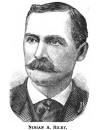
NINIAN A. RILEY
This enterprising
merchant and old settler was born in Edgar county, Ill., Jan.
29, 1844, and is the eldest son of Elder G. W. and Bethire
(McClain) Riley. He received a good English education in the
common schools of the county while residing with his father and
in the winter of 1860 and ’61 attended the Chicago University
for the purpose of adding still more to his scholastic
knowledge. While at this University Fort Sumpter was tired
upon. lie immediately
[Page 14]
MORE TO COME on NINIAN A. RILEY

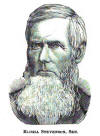
ELISHA STEVENSON, SEN.
Among the old settlers
of Champaign county is the subject of this sketch. He is a
native of Ohio, born in Columbiana county, May 23, 1817.
In early life he learned the hatter‘s trade in Pittsburg, Pa. In
following his trade he drifted about to different places, but
was for the greater part of the
time a resident of Ohio. In 1854 he came west to this
county and settled in Urbana, and here engaged in farming.
His health failing he was compelled to abandon hard labor and
for a number of years has lived a quiet, retired life.
While a resident of Hillsboro, Ohio, he married Miss
Nancy Ann Keelor. The date of the ceremony was June
24, 1849. They are the parents of eleven children, six sons and
five daughters. Their names are as follows: Lewis E.,
a prominent druggist and postmaster of St. Joseph; he married
Miss Ada O. Coffman. Cinderella, widow of C.
A. Lawhead. Elisha, jr., a conductor on the I.,
B.
[Page 15]
& W.; he married Miss Nora E. Trumbul, of Pekin, Ill.
Sara J., who is at home; Susan, wife of E. J.
Stephens, who is a conductor on the Missouri Pacific R. R.,
and resides at St. Louis; Josephine is the wife of

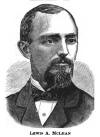
LEWIS A. McLEAN
Was born in Grafton. Illinois. May 5, 1843.
He removed to Urbana with his mother. Mrs. Mary B.
Vanderveer. and step-father, Cornelius M. Vandervcer,
from Vermillion county, Illinois, Apr. 15. 1853. His
father was Dr. John McLean, a physician.
and died in 1844, at Carlyle, Ill. His mother, now Mrs.
Mary B. Webber, resides in this city and is well known by
the old settlers of the county.
He attended the public school until eighteen years of
age. two years of which. in 1857 and 1858, was at the fourth
district high school in the city of New Orleans, La. In
December, 1862, he entered the office of the circuit clerk and
recorder of this county as deputy of W. H. Somers, then
serving his second term, and remained in that position for seven
years; he was then for a time deputy United States assessor.
From 1872 to 1879 he was engaged in mercantile pursuits.
In the fall of 1879 he accepted the position of book keeper and
assistant editor of the Champaign Gazette. which he tilled until
Oct. 9, 1882, when he took a position as associate editor of the
CHAMPAIGN COUNTY HERALD. with M. W. Mathews, its
proprietor. which position he still holds. The success of
the paper has been phenomenal in the newspaper history of the
county and it is only just to say. that as its business manager
and local editor. he is entitled to the credit for its unusual
growth and rapidly increasing circulation.
He was married May 12. 1864. to Miss Jennie E.
Russell, daughter of Dr. E. L. Russell, now of Des
Moines. Iowa. She is still living and is an active worker
in the Baptist church. Their children are: Nellie,
who is in her junior year at the University of Illinois;
Albert H. and Clair E. who are both at home and
attending school. Mr. McLean united with the
Baptist church in December 1863. and has been connected with the
Sabbath school as superintendent or assistant superintendent for
over twenty years. He has served two years as secretary of
the county Sunday school association and takes an active part in
the work.
He is also secretary of the Old Settlers' Association
of this county and is vigilant and active in rescuing from
oblivion every fact and incident with reference to the old
settlers of the county.
In politics he is a republican and has acted and voted
with that party ever since old enough to vote, casting his first
vote for Abraham Lincoln in 1864.
[Page 16]

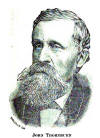
JOHN THORNBURN

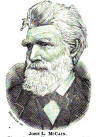
JOHN L. McCAIN.
[Page 17]
[Page 18]
[Page 19]
[Page 20]
[Page 21]
[Page 22]
[Page 23]
always been consulted about county as well
as township matters, and his influence has
always been great in political matters.
He is one of the leaders of the party in the
county. His memory is good and it is inter
esting to hear him relate the habits, customs,
hardships and incidents of the early days.
He owns over 600 acres of tine farming and
stock land and has it in a high state of cul
tivation. His memory is vivid as to the tow
hreeches the men and boys wore, made by
themselves from flair of their own raising.
and describes how they used to put a little
stripe in it for the Wbmen to wear; also how
they wore their winter clothing of yarn,
made at home and woven by the good wives
and mothers. Mr. Stayton is strong and ac
tive and is highly respected and beloved by
all his neighbors. He is known well by the
people of the country as one of our most reli
able and substantial citizens.

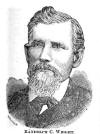
RANDOLPH C. WRIGHT.
The paternal grand
parents of Mr. Wright were born and died in
Frederick county, Va. They were farmers and of Scotch
descent. His maternal grand parents named Stevens
lived and died in Pennsylvania, and were of German descent.
His father, John B. Wright, was born in Virginia in 1785
and married Elizabeth Stevens in 1805. They
removed by a family boat down the Ohio to a point near Leesburg,
Va., where James S., as he puts it, without his knowledge
or consent, was born, Aug. 4. 1816. In spring of 1817 they
removed to where Winchester, Indiana, now stands. His
mother died there in 1835, and his father died here in 1869.
His father served from 1818 to 1824 in the Indiana legislature
at Corydon, the old capital. Here the boy James did
pretty much as other farmer boys, and in addition blowed the
bellows and wielded the sledge on the off side of the anvil, for
his father was also a blacksmith. He went to school three
months each winter where the old Scotch teacher would vary the
afternoon exercises by taking a nap, a drink of liquor and
whipping two or three boys. In 1830 the family came to
this county and bought land just north of Homer, September 24,
at $1.25 per acre. The ague then shook a man out of his
boots in an hour, if he had any (such luxuries were then
unknown) and malarial fevers were quite prevalent. Many
packed up and left this fertile county and wended their way
back, disgusted, to Posey county, Indiana, or old Tennessee.
Hay, corn and oats had no cash market value for many years.
They sold corn as low as four cents per bushel. During
these low prices Jackson vetoed the re-charter of the United
States bank and advised the state banks to discount liberally,
which they were not slow in doing. The “Red dog,” “Blue
pup” and a variety of currency followed. Banks were
organized in obscure localities and issued money, whose
whereabouts were never learned. Thus in 1835-6 produce was
booming in the worthless currency. Pork raised on the mast
from the woods was worth five or six dollars per hundred and all
were happy. The crash came in 1837 and the hardest of all
times followed. In 1837 when he lacked three months of
being of age, James S. “struck” for the remainder of his
minority, and after much persuasion, his father permitted him to
go and work on his own account, on the Illinois and Michigan
canal from the village of Chicago to the Illinois river at the
enormous salary of one dollar a day. He hired a farm hand
at ten dollars per month to work in his place for his father for
the three months of his minority. He remained there until
he had made enough to pay the hand and buy 40 acres of land for
$50.00. He then clerked for M. D. Coffeen until
1840 at $12.00 per month and then married Katherine
Lander, whose parents John and Sophia W. Lander,
moved from Bourbon county, Kentucky, October 1st. 1830, settling
near Mr. Wright’s farm. John
Lander died in 1837 and Sophia W. in 1849.
Katherine, the wife of James S., was born in
Bourbon county, Kentucky, March 26th, 1823. William
Elliott, Esq., of Homer, married a sister of Katherine
the same day. The two couples were united by Rev.
William Phillips (who married Charles Busey’s
daughter). Mr. Wright thought then he had a
[Page 24]
good wife, but now, after46 years of wedded life, he says he
knows it. Both had about $600 of this world’s goods when
they started on their joint journey of life. To support
her he first organized a subscription school, but after two
weeks of experience in “keep ing school" on receiving the
tempting offer of $25.00 per month to clerk again for M. D.
Coffeen, he got William Elliott to take the
school off his hands. He spent the winter with Mr.
Coffeen. He went to farming the next spring.
In the winter and spring of 1842-3 he packed pork at
Perrysville, Ind., built flat boats and shipped to New Orleans.
In 1844 he went as supercargo with pork for Gen. Olds, of
Circleville, Ohio. In 1845 he went to selling goods in
Homer on his own account, and so continued till 1855. In
1846 he was the Whig candidate against Col. M. W. Busey,
the democratic candidate for the legislature, and Mr.
Wright was elected by 50 majority. He met in this
legislature such men as Ex-Gov. Reynolds, U. F. Linder.
Gov. Matteson and Stephen T. Logan, then
leader of the house. Lincoln and David Davis
were there, but not members. Stephen A. Douglas was
elected senator, but Mr. Wright voted for Ben
Bend. the Whig candidate. From 1838 to 1850 he held the
office of county surveyor. He signed the first $1,000 to
the subscription to build the old college building which aided
this county so much in getting the University here. He
afterwards gave $500 more to get it completed. He looks
upon his effort in that direction as the crowning one in the
interest of Champaign, Urbana and the county. He served at
Danville as one of the enrolling commissioners for two years
during the war. In 1566 he. helped organize the First
Nation al Bank of Champaign and was cashier for three years.
He sold out his stock in bank and tried farming for about ten
years, mostly stock farming. All this time he took an
interest in politics. In 1880 he was nominated and elected
to the state senate for four years. Mr. Wright
often speaks of the fact that it seemed to him that there was
not the brains and talent there that he found thirty years ago.
He has never belonged to any church, nor to any order
or organization except every temperance society that came his
way. He is a firm believer in God and in the doctrine that
all men will be rewarded according to their acts while here on
earth. He has little faith in death bed repentance.
For fifty-six years Mr. Wright has lived in this
county and served faithful in many trusts, public and private.
He has never betrayed them and has won an enviable place in the
hearts of our people.

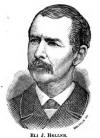
ELI J. HELLER.
In the language of
Prof. Draper: "Tell me of the country, the nature and
fertility of its soil, the lay of its land, &c., and I will tell
you the kind of men it raises." Nothing is truer.
Good, rich, generous soil produces broad, liberal-minded men -
no narrow contracted creeds or isms shrink and shrivel up the
soul of the man who is born, lives and thrives on the broad
fertile plains of the wet. Ohio has sent to Illinois a
class of men who have been an honor to the state.
Eli J. Heller was born in
Tuscarawas county, Ohio, Dec. 24, 1836. He is the
offspring of Thomas and Mary (Taylor) Heller. His
father brought his family to Urbana in the fall of 1851.
Here young Heller grew to manhood. He remained at home
until the breaking out of the late war. In July, 1861, he
enlisted in Co. I, 2nd Illinois cavalry. He served three
years when he veteranized with his regiment and remained in the
service until the close of the war. He was mustered out
and honorably discharged in 1866, having served four and a half
years. He returned home to Urbana and engaged in draying,
and in connection run a hack and baggage line. He
subsequently added coal to the business. Under his
industrious management the business grew to such proportions
that he found himself unable to attend to it, and was compelled
to call in assistance. He then formed a partnership with
Josiah Toy, and together they have built up a.
trade that is second to none in this part of the state.
They are well equipped for the business, with carriages, baggage
wagons, vans and drays, and at a moment's
[Page 25]
notice will fit you out with an elegant turnout, haul your
baggage, move your furniture, supply you with soft or hard coal
in quantities from a bushel up to a car load. Mr.
Heller has grown up with the town and is numbered among its
most respected citizens. He was a member of the board of
aldermen for eight years during which time many of the
substantial improvements of the town were made. He is
prominent in Masonic circle and holds membership in various
orders in that body.
Mr. Heller was united in marriage with Miss
Sarah Ella Black, Nov. 20, 1866. She died in April,
1881, leaving three children, named Opal B., Birdie and
Aaron T. Heller. Politically Mr. Heller
comes from old line whig stock. He cast first first vote
for Abraham Lincoln in 1860. He attested his
adhesion to that party (republican) and loyalty to his country
by his enlistment in the army, where he remained, as before
stated, until the war was over. Political comment is
unnecessary.

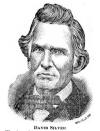
DAVID SILVER
[Page 19]

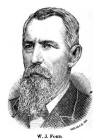
W. J. FORD.
[Page 20]

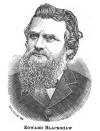
EDWARD BLACKSHAW
[Page 21]

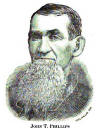
JOHN T. PHILLIPS.

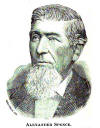
ALEXANDER SPENCE.
|

![]()

![]()